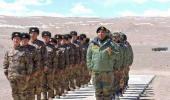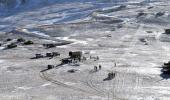'The Chinese are only about 160-170 km behind.'
'It will not take much time for them to bring their troops back, considering that they have better infrastructure -- and the weather is now favourable.'
'They can move in much faster as the terrain favours them.'

"India and China have displayed maturity as there have been no recent clashes on the LAC. On the LoC, the armies of Pakistan and India have also decided to de-escalate the situation resulting in a ceasefire."
"At the moment, India, Pakistan and China seem more balanced and have relative stability in the region compared to the turbulence existing in their extended neighbourhood," says Lieutenant General P J S Pannu (retd), former commander of the Leh-based XIV Corps.
The general served several tenures on the Line of Actual Control during his four decades of service in the Indian Army and also commanded a brigade at Uri on the Line of Control.
He discussed the disengagement at the LAC after 11 rounds of talks between the military commanders of India and China with Rediff.com's Archana Masih.
After the 11th round of corps commander talks, do you sense a Chinese refusal to disengage further?
At the present moment, there is relative peace between India-China and India-Pakistan as compared to the prevailing geo-political turbulence around the world.
The Chinese are on the LAC at certain points, but there has been a disengagement in the Pangong Tso area -- and that is where we stand after 11 rounds of talks between the two corps commanders. India has maintained that it wants restoration of status quo ante as of April 2020.
In the context of Pakistan, the armies of Pakistan and India have also decided to de-escalate the situation resulting in a ceasefire on the Line of Control.
Meanwhile, the world is witnessing several strategic and military flashpoints. The Chinese are in direct confrontation in the South China Sea. They have intruded into Taiwanese airspace, compelling the Americans to also display their war resources in those waters.
In Myanmar there is a military coup with indications of a Chinese hand, while Russia is trying to make the most out of the situation.
There is tension between Israel and Iran about the attack on Iran's nuclear facilities.
The Chinese have signed certain agreements with Iran including purchasing record amounts of crude oil.
The Russians are in direct confrontation with Ukraine which is turning to Turkey for support. A coalition of Arab States led by Saudi Arabia launched air strikes against Houthi rebels in Yemen. There is a serious situation brewing in that area.
Looking at the world around us, we can see that the extended region is very disturbed. The present Covid surge in India is galloping out of control. We do not know where it will end. The vaccine is also being used for diplomacy all over the world so the global situation is being marked with activities like trade, diplomacy and military confrontation.
As far as India is concerned, we recently had the first Quad summit which gave the veiled indication that its basic aim is to contain China.
The latest level of talks between the military commanders of India and China did not have the desired outcome as far as disengagement from other areas on the LAC like Hot Springs, Gogra and Depsang is concerned. What fresh challenges does that throw?
The disengagement began post the 9th corps commanders meet. The disengagement happened suo moto by the Chinese when they decided to withdraw.
They also wanted Indian to pull out from south of Pangong Tso because the Indian presence there had made the Chinese very uncomfortable. At that time, south of Pangong Tso was India's only leverage.
I'm quite confident to say that the action south of Pangong Tso was one of the major factors behind the Chinese decision to pull out because that relieved the pressure on their Moldo garrison.
The Chinese have no more to achieve from their perspective because it does not help their cause. India would want them to disengage from Gogra, Hot Spring, Depsang, but India may not have the required leverages.
The troops in Pangong Tso also haven't moved out of that sector entirely. The Chinese are only about 160-170 km behind. It will not take much time for them to bring their troops back, considering that they have better infrastructure -- and the weather is now favourable. They can move in much faster as the terrain favours them.
China is trying to prove to India and the world that they are getting bolder and belligerent.
Yet, in this prevailing turbulent environment, India, Pakistan and China seem more balanced and have relative stability in the region, but the situation is very disturbed in the extended neighbourhood.
India and China have displayed maturity as there have been no incidents of recent clashes on LAC.

What do you think is China's end game?
The Chinese are trying to prove that they are the decision makers. They are also testing to see if American support to India through Quad is a credible deterrence against them. They are trying to gauge if Quad as a response to the Chinese threat is shaping up well.
On the other hand, they have imposed counter-sanctions on the EU after the latter sanctioned Chinese officials because of atrocities against Uighurs in Xinjiang.
The West and the Muslim world are looking at China differently and China is testing the waters. It is following a policy of ambiguity.
By maintaining stability on the ground on the LAC, China also wants to show that it is the sole decision-maker. China wants to position itself higher than India.
Post the 11th corps commanders meeting, the State-owned Chinese media said India should cherish the de-escalation. What does it mean? Do they mean that India is enjoying the benefits of de-escalation extended by the Chinese? Are they saying that the de-escalation process is deliberately decided by them?
Disengagement has not resulted in de-escalation of forces because the Chinese will recalibrate their grand strategy based on how Quad shapes up.
The Chinese are making statements that the boundary dispute will be settled on Chinese terms and those terms are not very well defined. It would mean that they are capable of including J&K which would make Pakistan a stakeholder in the larger settlement of the boundary issues.
This can never be an option for India because China's terms are detrimental to our own security interests and strategy.
This positioning has been done by the Chinese to ensure that India does not forge alliances such as Quad. If the India-US relationship shapes up into a credible deterrence, then the Americans need to do much more than the demonstration in the South China Sea around Taiwan.
The Chinese have put the aircraft carrier Shandong to the water and have two aircraft carriers in that area. It will take them time to operationalise them, but it is happening.
How is Chinese military belligerence going to impact the world and what bearing does the enhanced India-US military relationship have on China?
There is already a dispute between China, Taiwan, Vietnam, the Philippines, and Malaysia concerning the ownership of the Spratly Islands. Indonesia has a tense relationship with China north of the Natuna islands. Chinese belligerence is going to even impact ASEAN because the equilibrium is being disturbed in that area.
The Chinese will continue their debt diplomacy. They will continue to buy off certain countries and time will tell how future military alliances shape up. It is not only Quad -- US, India, Australia and Japan, but there is going to be some realignment and rebalancing of forces.
Russia might also become a relevant player because it is showing military intent for its own relevance. There are many flashpoints coming up in the world and we have to see which side the globe is tilting.
However, I think China does not want India to become a stumbling block in its own aspirations of becoming the number one power in the world, ahead of USA by 2050.
That is why China wants to keep India under check. This is going to lead to a lot of stress because the Americans are not going to allow the Chinese to surpass them with ease. India will be impacted in this contest because of its geostrategic location.
Our military and diplomacy have a great responsibility to ensure that we do not get into the crosshairs of this contest and continue to exercise strategic autonomy.
We have to keep working towards the extension of our own foreign policy to protect and pursue our national interest.
Feature Presentation: Aslam Hunani/Rediff.com










